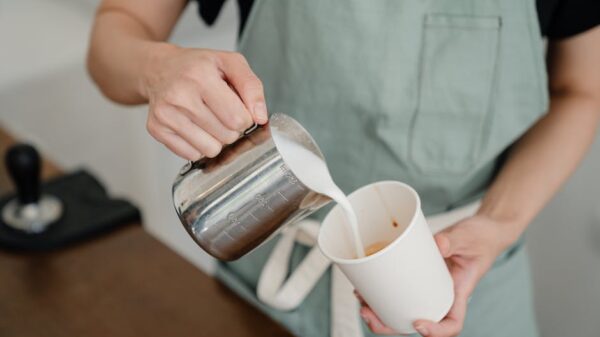The Effects of Coffee On the Body
During the process of roasting, coffee beans release a group of volatile organic compounds that contribute to coffee’s unique flavor and aroma.
The amount and types of compounds that are extracted into the brew depend on several factors: type and roast degree of the bean, water temperature and contact time, grind size, and other variables such as preparation method (e.g. espresso). Everyone has their morning cup of coffee or tea, whether it be a simple cup or a grande caramel macchiato.
But how does coffee affect the body? Many seem to think that having a couple of cups a day is fine, but there are many side effects and benefits from drinking caffeine at different levels. Coffee, one of the world’s most popular drinks, has long been considered a guilty pleasure. Many people are aware that coffee can have negative health effects when over-consumed.
However, more recently experts have begun recognizing its vast array of health benefits, making it difficult for many to stick with their decision to lay off the drink. Coffee can affect one’s body through your metabolism, act as a diuretic, increase antioxidant levels, adjust hormone levels, increased cognitive function, affect sleep, change productivity and overall health.
Change in Metabolism
Besides flavor, coffee can affect the body’s metabolism by acting as a natural stimulant to reduce fatigue and hunger, due to its caffeine content. However, some studies have concluded that decaffeinated coffee has the same metabolic effects as caffeinated coffee.

Diuretic
Coffee may also act as a diuretic, an agent that will increase the output of urine. Also, because it can increase the production of stomach acid and cause heartburn, coffee may harm those who already have ulcers or other stomach problems. Excessive caffeine intake has been linked to anxiety disorders in some people.
Antioxidants
The most beneficial effect of coffee is that it has been shown to increase antioxidant levels in the body, which may help prevent cell damage in the brain. However, it should be noted that research in this area is conflicting with some studies suggesting an increase and others a decrease in antioxidant levels after coffee consumption.
Even with the recent rise in popularity of green coffee extract supplements, many people are still skeptical about how much coffee is healthy. One question that often arises is whether there are negative effects of coffee on hormones.
Hormones
Caffeine consumption has been shown to have a wide range of effects on hormones, depending on how much is consumed. Caffeine is known to increase cortisol levels, which is the primary stress hormone in humans. Studies have found that caffeine ingestion can cause cortisol to double within an hour of ingestion.
Cortisol has long been considered a bad hormone with negative effects on brain health, mood, and weight regulation. However, cortisol also has positive effects on our bodies, such as stimulating blood glucose levels and improving alertness.
Cortisol
Cortisol is typically secreted throughout the day to help us act quickly when needed by increasing our heart rate and blood pressure. However, this can be harmful if too much cortisol is secreted.
Caffeine, by blocking adenosine receptors, increases the secretion of cortisol within the brain to non-fatigued levels. This can cause an effect referred to as “adrenergic antagonism.”
Benefits of Caffeine on Cortisol
Although caffeine may cause cortisol levels to rise in non-fatigued individuals, studies have found that caffeine can help reduce the secretion of cortisol throughout the day.
This means that caffeine may be able to enhance performance during exercise by increasing our physical output while decreasing negative stress effects. This is not only beneficial for athletes but any person looking to increase their daily performance.
Coffee Effect Testosterone?
Caffeine, by blocking adenosine receptors, can increase the secretion of dopamine- which leads to higher levels of testosterone production in both men and women. Dopamine also stimulates the release of endorphins and serotonin- two neurotransmitters that allow for a feeling of heightened well-being.

Coffee and Testosterone
In a study done on male rats, it was found that caffeine ingestion increased testosterone synthesis in the testes by up to 50% and sperm motility by 32%. The researchers concluded that their findings indicated human studies should be conducted to determine whether caffeine is an effective treatment for infertility in men.
A study conducted by the University of Nebraska tested the testosterone, cortisol, and caffeine levels of male volunteers immediately after performing resistance training exercises. The results showed that those with post-workout high caffeine levels had greater strength output, higher testosterone levels, and lower cortisol production than those with low caffeine levels.
The researchers concluded that caffeine ingestion after resistance training may increase anabolic hormone production, leading to greater strength and muscle mass gains than by training alone. This would be beneficial for anyone looking to build muscle or increase strength- especially if overtraining is a concern.
Coffee and Cognition
A study done at Loughborough University showed that moderate to high coffee consumption (5 or more cups per day) significantly increased controlled attention by up to 20% compared to low consumption. This shows that heavy coffee drinkers have a significantly increased ability to concentrate and process information.
A study conducted by Harvard University showed that cognitive function was improved after a single dose of caffeine, as well as sustained for 3 hours. This means that coffee is effective at making us more alert and aware immediately after ingestion.
A study conducted at the University of Helsinki showed that caffeine can increase alertness and motor speed by up to 16%. This means that coffee is effective at increasing focus, concentration, and reaction time over a long period.
Although some studies show that caffeine does not reduce sleep latency (the time it takes to fall asleep), others show that it does.
Caffeine and Sleep
A study conducted by the University of South Australia found that caffeine can extend wakefulness in moderate doses, but not in large doses. They also found that sleep time did not increase due to caffeine ingestion- even when habitual users were taken off of caffeine for a week. This shows that while caffeine may not make us fall asleep faster, it can increase wakefulness.
A study conducted by the University of Florida showed that caffeine increased the amount of time spent awake during 6 hours of sleep deprivation compared to non-caffeine users. They also found that levels of fatigue did not significantly change. This means that caffeine is effective at keeping us awake, even without the effects of sleep deprivation.
The same study had participants take 3mg/kg of caffeine right before bedtime on each night of the experiment. They found that this increased the amount of time spent awake during 6 hours on the first post-treatment night compared to the first night, but it did not affect the second post-treatment night.
They concluded that caffeine can cause an acute reversal of sleep when consumed immediately before bedtime. This means that caffeine is effective at increasing wakefulness directly before bedtime if it has been previously consumed during the day.
Coffee and Productivity
A study conducted by the University of Illinois showed that energy drink users had a decreased ability to focus on simple tasks compared to coffee drinkers. This shows that energy drinks decrease productivity and focus over a short period.
A study done at Loughborough University showed that caffeine increased motivation by up to 20%. This means it is effective at making us more motivated in long-term tasks over a long period.
A study done at the University of Georgia showed that caffeine increased speed and accuracy on simple tasks by up to 20%. This means that coffee is effective at increasing productivity when completing complex, quick tasks over a short period of time.
A study done at Loughborough University showed that drinking coffee led to a 24% increased number of completed tasks. This means that coffee is effective at increasing productivity over a long period.
A study conducted by the University of Georgia showed that caffeine increased speed and accuracy on simple tasks by up to 20%. This means that coffee is effective at increasing productivity when completing complex, quick tasks over a short period.

Caffeine and Health
A study done by Johns Hopkins University found that people who drank large amounts of coffee had a 65% lower risk of developing Parkinson’s disease compared to those who drank no coffee. This means that coffee is effective at preventing the development of Parkinson’s over a lifetime.
A study done by the Harvard School of Public Health found that women who drank more than one cup of coffee per day had a 25% lower risk of developing Type 2 diabetes compared to those who did not drink any coffee or drank less than one cup per day. This means that coffee is effective at lowering the risk of getting Type 2 diabetes by up to 25% over a lifetime.
A study done at Harvard University found that men with early stage prostate cancer who drank more than 4 cups of coffee per day had a 75% lower risk of developing metastatic prostate cancer (cancer spread beyond the prostate) compared to those who drank no coffee or less than 2 cups per day.
This means that coffee is effective at lowering the risk of metastatic prostate cancer by up to 75% over a lifetime (for men with early-stage prostate cancer).
Drinking coffee is a great way to wake a person up in the morning, but it also has many medical benefits. Caffeine is a great stimulant and can greatly benefit both men and women. The main effect coffee has on the body is that it stimulates hormone production, which then increases metabolism and reduces stress levels while enhancing moods and memory capacity.
Effects From Coffee
With the pervasive use of coffee, more and more research is being done on its effects on humans. While there are some positive effects advertized by the coffee market, this article will prove otherwise using several different studies on the topic.
For example, it has been proven that people who drink four or more cups of coffee per day tend to have elevated heart rates, disrupted sleep patterns, and a heightened sense of nervousness even after the caffeine has been metabolized.
Coffee also has a more direct effect on anxiety which is shown by systematic studies. In one case, people who drank coffee every day for a month had heightened brain activity when shown pictures of angry faces.
The continual use of highly caffeinated and highly sweetened coffee has also been linked to anxiety and depression in the long term. People who drink this type of coffee on a regular basis tend to be more likely to suffer from depression and anxiety than those that do not drink such coffee.
It is clear that people should decrease their intake of these coffees if they want to prevent feelings of unease, nervousness, and rapidly increased heart rates.
Final Thoughts
Although coffee does contain some chemicals that can cause positive effects (e.g. L-theanine), they are not enough to outweigh the negative effects on mood and health in most people who drink coffee regularly. Furthermore, these individual compounds also do not have as large of an effect individually as caffeine does.
Therefore, it is not necessary to drink coffee to gain these positive effects from the individual compounds. There are many negative side effects of drinking coffee daily. Many of these can be alleviated by simply decreasing or stopping your intake of caffeine altogether.





























